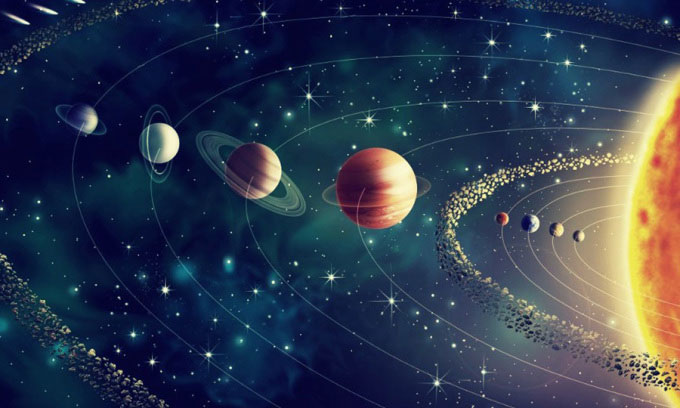When do all eight planets in the Solar System align?
Although they sometimes appear close together and relatively straight when viewed from Earth, the planets are actually very far apart in space .
During their journey around the Sun, some planets will sometimes appear aligned when viewed from Earth. But did these eight planets ever really align? The answer depends on the definition of "alignment".

The Solar System includes 8 planets: Mercury, Venus, Earth, Mars, Jupiter, Saturn, Uranus and Neptune. (Photo: Orbital Today)
The 8 planets in the solar system include Mercury, Venus, Earth, Mars, Jupiter, Saturn, Uranus and Neptune. The orbits of the planets are tilted to different degrees relative to the Sun's equator. This means that while planets appear to be aligned in the sky, they may not actually be in a straight line in 3D space, according to Arthur Kosowsky, an astrophysicist at the University of Pittsburgh.
" The concept of planetary alignment is more about what is observed from the perspective of humans on Earth rather than actual physical alignment in space , " said Nikhita Madhanpall, an astrophysicist at Wits University, South Africa, said.
A planetary conjunction occurs when two or more planets appear close together when viewed from Earth. It should be noted that these planets are not actually close to each other. Even though they appear to be aligned with humans on Earth, they are still extremely far apart in space.
How close together can the planets be considered aligned? This is still not clearly defined, according to Wayne Barkhouse, an astrophysicist at the University of North Dakota. This definition will involve angularity - how astronomers measure the visible distance between two celestial bodies in the sky.
If the distance is measured around the circle of the entire horizon, the result will be 360 degrees. To visualize the vastness of the horizon, remember that the full moon is only half a degree in diameter, according to the Las Cumbres Observatory in Goleta, California.

Saturn (above) and Jupiter (below) appear close together as seen from Shenandoah National Park, USA, on December 13, 2020. (Photo: Bill Ingalls/NASA).
In the 1997 book Mathematical Astronomy Morsels, Jean Meeus, a Belgian meteorologist and amateur astronomer, calculated that the three innermost planets of the solar system - Mercury, Venus, Earth - are straight. rows within 3.6 degrees on average every 39.6 years.
Aligning more planets takes more time. According to Meeus, all eight planets will align within 3.6 degrees every 396 billion years . "So this event has never happened and will not happen, because the Sun will turn into a white dwarf star in about 6 billion years. During this process, the Sun will transform into a red giant star and swell , swallowing both Mercury and Venus, possibly even Earth. Therefore, there will only be 5 planets left in the solar system ," Barkhouse said.
The likelihood of eight planets aligning within 1 degree of the sky is even lower. According to Meeus, this happens on average every 13.4 trillion years . Meanwhile, the universe is thought to be only about 13.8 billion years old.
If the eight planets are considered to be in a straight line when located in the same 180-degree part of the sky, the next time this event occurs will be May 6, 2492 , according to Christopher Baird, associate professor of physics at West University. Texas A&M. The last time the eight planets aligned within 30 degrees was January 1, 1665, and the next time will be March 20, 2673, according to the National Solar Observatory's facility at Sacramento Peak, California.
The alignment of the planets has almost no significant physical impact on Earth, Madhanpall noted . "The only impact on life on Earth when the planets align is the amazing show in the sky. There's no risk of enhanced earthquakes or anything like that. The change in gravity The conductivity that Earth experiences during any planetary alignment event is negligible ," Barkhouse said.
- Unknown mystery about planets outside the solar system
- Discover more than 700 planets outside the solar system
- Planets in the Solar System
- The distance from the Earth to the celestial bodies in the solar system
- Why are there so many asteroids in the Solar System?
- Space Science: The order of 8 (or 9) planets in the Solar System
- NASA announces a map of 4,000 planets outside the Solar System
- Latest images of 7 planets in the Solar System version 2.0
- 4 'stars' Kim, Wood, Fire, Earth are aligned in the sky
- Discover the oldest solar system outside the solar system
- Detection of the Solar System may contain Earth-like planets
- How the plane took off on the solar system planets
 Van Allen's belt and evidence that the Apollo 11 mission to the Moon was myth
Van Allen's belt and evidence that the Apollo 11 mission to the Moon was myth The levels of civilization in the universe (Kardashev scale)
The levels of civilization in the universe (Kardashev scale) Today Mars, the sun and the Earth are aligned
Today Mars, the sun and the Earth are aligned The Amazon owner announced a secret plan to build a space base for thousands of people
The Amazon owner announced a secret plan to build a space base for thousands of people